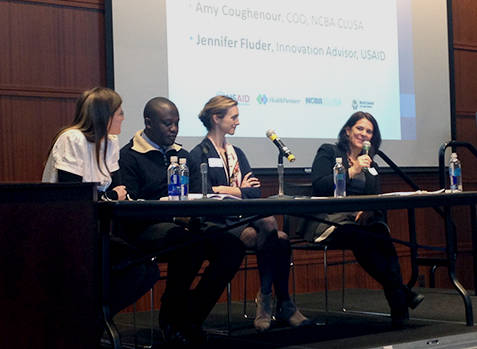 Many U.S. cooperative development organizations (CDOs) engage not only in local community development, but support economic and social development globally as well.
Many U.S. cooperative development organizations (CDOs) engage not only in local community development, but support economic and social development globally as well.
Last week, NCBA CLUSA, HealthPartners and the World Council of Credit Unions (WOCCU) led an interactive workshop on strengthening partnerships for the international development community featuring Amy Coughenour, NCBA CLUSA COO for International Development; Tom Carter, Senior Advisor for Cooperative Development for the U.S. Agency for International Development; and USAID Innovation Advisor Jennifer Fluder.
Held at National Rural Electric Cooperative Association (NRECA) headquarters in Arlington, Virginia, the one-day workshop, entitled “Impact That Lasts: Why Partnerships Are Crucial, Why They Are Ineffective, What We Can Do About It,” provided new insights into how international development organizations and donors can work more closely with local governments, private-sector companies, non-governmental organizations and competitors to achieve sustainable results.
Partnerships are critical for the sustainability of international development projects, but they too often fall short of their potential. On one hand, Fluder said, “Partnerships are pivotal in all that we do,” but on the other, Carter added, “Partnerships have baffled most of us, most of the time.”
The participatory workshop highlighted several critical factors for developing successful partnerships, such as open and honest communication between partners; intentional investment of time, talent and resources into a partnership; alignment of partners’ mission, vision and objectives; and the ability of an organization to admit failure and learn from its experiences.
During the panel discussion portion of the workshop, Coughenour highlighted NCBA CLUSA’s partnership with Mukwano—a private-sector company in Uganda—that has yielded tremendous impact in NCBA CLUSA’s Uganda Conservation Farming Initiative. One of the objectives was to train 60,000 smallholder farmers in conservation farming (CF). “Alone we could reach only 45,000 farmers, but with Mukwano we were able to reach 60,000 farmers,” Coughenour said. She reported that yields have increased on average by 47 percent, and added that some farmers who applied all CF practices properly have seen a 100 percent increase. Additionally, smallholder farmers’ incomes have increased on average by 63 percent, and some farmers with more land have increased their incomes by 100 percent. Coughenour explained that the true alignment of missions, visions and objectives made these achievements possible.
Herbert Asiimwe of HealthPartners spoke to the power of cooperatives in partnerships, giving an example from Uganda where sick people who had trouble paying back their bank loans were able to join a health cooperative to receive the extra support they needed. The banks and health cooperatives were able to enter into a partnership that was mutually beneficial.
The intentional relationship-building that is needed to strengthen partnerships was also emphasized throughout the workshop, not only in discussions but also in the format of the workshop, which was largely participant-driven and structured around open communication.
“Partnerships are relationships,” Coughenour said. “Each entity brings a different set of skills, ideas and strengths, and you come together to do something that is bigger than each of you.”
NCBA CLUSA’s international program has more than 60 years of experience in over 100 countries. The organization currently implements a portfolio of $200 million in 16 countries in Africa, Latin America and Southeast Asia in the areas of agriculture, food security and nutrition, community-based health, natural resources management, democracy and governance, and women and youth. HealthPartners—the largest consumer-governed, nonprofit healthcare organization in the U.S.—provides technical assistance to local stakeholders in developing countries to create and manage health cooperatives that increase access to quality health care services and improve health outcomes. WOCCU has promoted economic security and livelihoods strengthening in over 70 countries through the sustainable development of local cooperative financial institutions.
In 2013, NCBA CLUSA, HealthPartners and WOCCU were awarded a three-year cooperative agreement through USAID’s Cooperative Development Program (CDP) to create a cross-sector program design to address Haiti’s complex development challenges. This Partnership Workshop served as a platform to share their lessons learned on appropriate, effective communication with local stakeholders with the broader development community.


